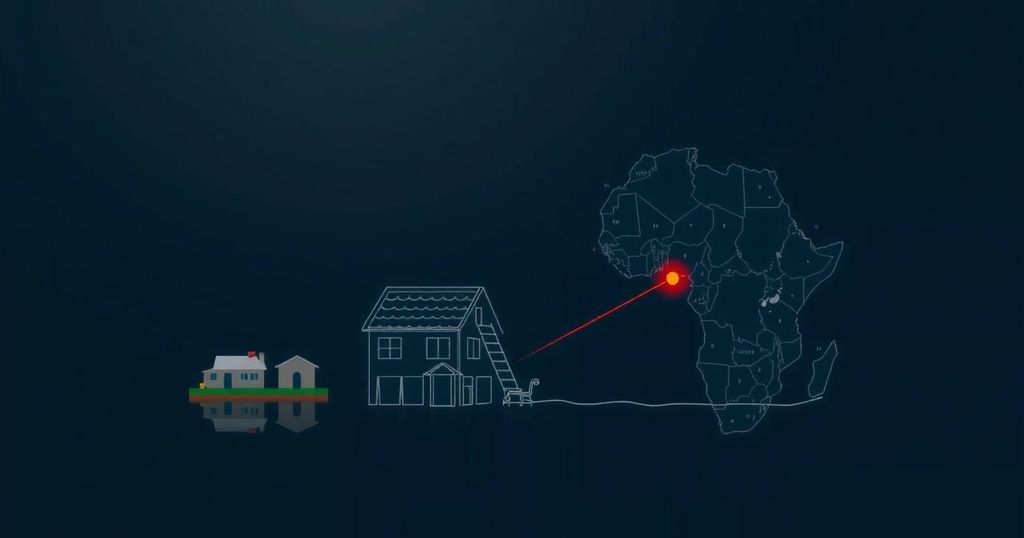Severe Flooding Crisis Affects Millions in Chad, Nigeria, and Cameroon
Over 2.7 million people have been impacted by severe flooding across Chad, Nigeria, and Cameroon due to extensive torrential rains. Chad has been hit hardest with over 1.7 million affected and significant damage to homes and agriculture, followed by Nigeria and Cameroon. Action Against Hunger is calling for urgent funding to assist with emergency responses and alleviate hunger risks in these regions.
Severe flooding resulting from torrential rains across Central and East Africa has left millions in dire circumstances. A staggering 2.7 million individuals have been impacted, which includes 1.7 million in Chad, one million in Nigeria, and over 230,000 in Cameroon. In light of the considerable damage to homes and agriculture, Action Against Hunger has urgently called for funding to facilitate an emergency response aimed at helping the most vulnerable populations in the region. In Chad, the flooding commenced in late July and has persistently affected numerous provinces including Lac, Mayo-Kebbi Est, Mandoul, Tandjilé, and Batah. The Sila province, which is housing refugees from Sudan, has also suffered greatly. The floods have claimed over 500 lives and led to the destruction of more than 210,000 houses, 880,000 acres of farmland, and approximately 70,000 livestock. The situation poses a significant hunger risk, particularly as 3.4 million people were already experiencing severe food insecurity in Chad. Gusatve Gnagny, the Country Director for Action Against Hunger in Chad, highlighted that “The affected populations are facing critical needs for food, drinking water, shelter, health and protection” and emphasized the urgent requirement of nearly $100 million in aid, of which only 10% has thus far been secured. In Nigeria, flooding has severely impacted multiple states including Borno, Adamawa, Bauchi, Enugu, Jigawa, Kanu, Bayelsa, and Yobe, displacing tens of thousands and exacerbating the food insecurity crisis affecting over 32 million individuals prior to the floods. Notably, Maiduguri, the capital of Borno state, has been submerged, affecting 414,000 residents. Thierno Samba Diallo, the Country Director for Action Against Hunger in Nigeria, reported, “The floods have damaged over 300,000 acres of farmland in Nigeria,” indicating an imminent threat to food security during the ongoing lean season. In Cameroon, the Far-North region records over 236,000 flood-affected individuals with more than 30,000 acres of crops destroyed, raising alarms about potential waterborne diseases. Pascal Maillard, the Country Director in Cameroon, declared, “Certain infrastructure such as bridges and dykes have already collapsed, which will generate massive population displacements.” He underscored the need for immediate humanitarian response, including food, shelter, and sanitation provisions. The ongoing climatic shocks in Chad, Nigeria, and Cameroon highlight the increasing frequency of natural disasters that threaten fragile livelihoods and exacerbate hunger. Action Against Hunger has been operational in Chad since 1981, in Nigeria since 2009, and in Cameroon since 2013, working diligently on various fronts including nutrition, health, water sanitation, and food security.
Severe flooding has struck Central and East Africa, primarily affecting Chad, Nigeria, and Cameroon. The combination of torrential rains and existing vulnerabilities in these regions—such as food insecurity exacerbated by the climate crisis—has led to widespread devastation. These conditions are often intensified by existing political and socioeconomic challenges, compelling humanitarian organizations to respond urgently to the needs of affected populations. Action Against Hunger, a notable humanitarian organization, aims to address these pressing challenges through emergency response initiatives as well as long-term development programs across the affected areas.
The flooding crisis across Chad, Nigeria, and Cameroon is an urgent humanitarian disaster affecting millions. With homes and agricultural land severely damaged, populations face imminent risks of food and water shortages. The call for substantial funding and robust response efforts is critical as communities grapple with the aftermath of this disaster and the ongoing threat of climate change. Action Against Hunger’s commitment to addressing these pressing needs underscores the necessity for immediate action and sustainable solutions to support recovery in these vulnerable regions.
Original Source: www.actionagainsthunger.org




Post Comment